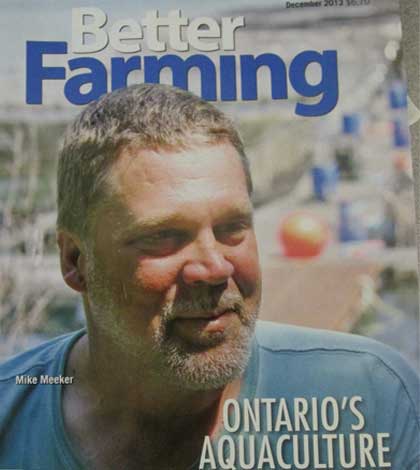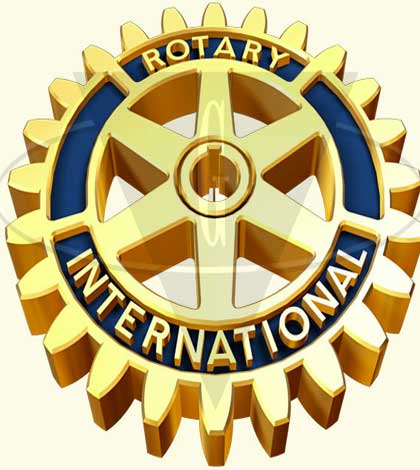EVANSVILLE—The fact that Ontario’s aquaculture industry is featured as the cover story of this month’s edition of ‘Better Farming’ magazine is indicative of a change in attitudes that aquaculture is now considered a legitimate industry, says the president of the Northern Ontario Aquaculture Association (NOAA).
Mike Meeker, whose photo is on the cover of the December edition of the magazine under the headline “Ontario’s Aquaculture Industry Comes of Age,” told the Recorder, “I never expected the story would be on the front page and would be a long feature article. Usually when we get press in magazines we might get a half page at the most. I think the fact it’s the featured article is indicative of a change in attitude that aquaculture is a legitimate industry. Compared to beef and cereal crops, the chicken industry and others, it is now being recognized and (is) proof that the industry is a legitimate agriculture enterprise and is going to grow in the future.”
Among those quoted in the article include Steve Naylor, an aquaculture specialist with the Ontario Ministry of Agriculture and Food, Gord Cole, Ontario’s largest rainbow trout producer, Karen Tracey, NOAA executive director, Richard Moccia, an aquatic scientist at the University of Guelph, and others. They discuss the history of the industry, the challenges it has met, and its future.
“From my perspective, we are being very cautious but optimistic. We feel the industry is in a better place than we were 20 years ago; people are eating more fish than beef—although the beef industry is still tremendously important and viable,” said Mr. Meeker. “The average person realizes if they are going to eat fish, that farm raised fish make up the shortfall in supply. It is a good quality, healthy product.”
“In the case for most of our operations (in Northern Ontario), by keeping and collecting all environmental data, we can prove over the past 20-30 years that there is negligible impact on the environment, and in some aspects positive impacts on the environment with raising fish the way we do. We have been saying the same thing for at least the past 10 years and it seems people are more willing to listen and are more open-minded to our industry.”
“I don’t believe the lower number of fish catches commercial fisheries have undergone in the past few years has anything to do with the fishermen themselves, they are still severely hampered by regulations. There isn’t one factor, there are a whole bunch, things like zebra mussels and invasive species that have cut into the fishing industry, that commercial fishermen have no control over.”
“In my opinion our industry is poised to grow more fish, expand the industry and continue to do so, as I and others have done over the past 30 years, doing it right and the best way to grow fish,” said Mr. Meeker.
“As an industry we still have to monitor our operations more than I feel we need to,” said Mr. Meeker. “But the mandate of the ministries of Natural Resources and Environment is to maintain the environment and we make sure and monitor our operations stringently for all things that could potentially impact on the environment.”
“For the most part the relationship we’ve had with the two ministries has been pretty good,” said Mr. Meeker. “There is definitely a feeling of cooperation between the ministry’s and our industry.”
As for the future of the aquaculture industry, “the future looks really good, and there will be more growth and different types of methods and species of fish.”
“We, the NOAA, support the expansion of growing alternative species of fish,” said Mr. Meeker. “When you look at our resources in Ontario, we have a 1,000 times more water resources than countries like France, Germany and Italy and they still grow more fish than we do. So we still have a lot of room for expansion.
Meeker’s Aquaculture partnered with Blue Goose, “and I’m excited to be working with Blue Goose, with the goal of growing more fish in a responsible way,” said Mr. Meeker.
“There are still guys like me and Gord Cole, who have been in the industry for 30 years, and it seems we are getting a new lease on life because our industry is growing. We grow great fish, in a responsible way, and I think everyone believes we are a legitimate industry.”





